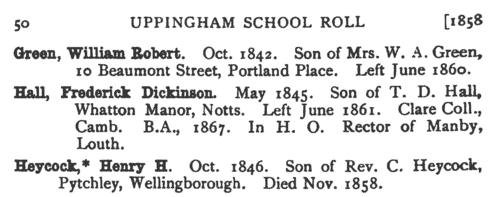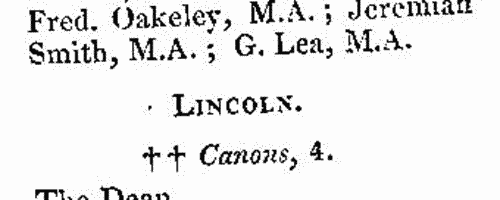Add this eBook to your basket to receive access to all 1,833 records. Our indexes include entries for the spelling baxter. In the period you have requested, we have the following 1,833 records (displaying 971 to 980): These sample scans are from the original record. You will get scans of the full pages or articles where the surname you searched for has been found. Your web browser may prevent the sample windows from opening; in this case please change your browser settings to allow pop-up windows from this site. Tenants and occupiers of Hempnall
(1840)
The register of electors entitled to vote in any parliamentary election for East Norfolk between 1 November 1840 and 1 November 1841 lists 8,556 freeholders arranged by hundred and within hundred by parish or township &c. In the first column, after number within the register, the elector's name is given (surname first); the second column gives place of abode; the third column the nature of qualification (such as 'owner and occupier'); and the fourth column the address of the qualifying property, in some cases with the name of the tenant or occupier. | Sample scan, click to enlarge

| Bankrupts
(1841)
Bankruptcy notices for England and Wales: bankruptcy often caused people to restart their lives elsewhere, so these are an important source for lost links
| Sample scan, click to enlarge

| Bankrupts' Assignees
(1841)
Assignees of bankrupts' estates (usually principal creditors and/or close relatives of the bankrupt) in England and Wales | Sample scan, click to enlarge

| Boys entering Uppingham School
(1841)
The public school at Uppingham in Rutland was founded by Archdeacon Johnson in 1584. A roll of scholars from 1824 to 1905 was edited by J. P. Graham, and published in 1906. This was a revision and updating of an 1894 edition of the roll, the great bulk of the work having been done by Mrs Mullins. The roll is arranged by year, and within each year by term of entrance, and then alphabetically by surname within each term. Each boy's name is given, surname first, with an asterisk where known (in 1906) to have died. Then there is month and year of birth, father's name (most often just surname and initials) and address (at entrance). Where the boy represented the school at Rugby football (XV) or cricket (XI), that is indicated. After the month and year of leaving the school, there is a brief summary of achievements in later life, and, where known, address as in 1906. | Sample scan, click to enlarge

| Churchmen and church officers in England and Wales
(1841)
The Royal Kalendar has an extensive ecclesiastical section, giving the names of officials at the College of Doctors of (church) Law, the Ecclesiastical Courts, and the ecclesiastical law proctors; deans, chancellors, archdeacons, canons and prebendaries for all the dioceses of England and Wales; the officers and fellows (being all the parish priests within and without the walls of London) of Sion College; and the incumbents of the parishes within ten miles of London (annotated to show whether rectors, vicars or curates, and with the net annual revenue of each cure); the Ecclesiastical Commissioners for England; the Committee of Council on Education; and then the officers of the various religious societies (Queen Anne's Bounty Office, and First-Fruits and Tenths Offices; Commissioners for Building Additional Churches; Society for Promoting the Building of Churches and Chapels; Anniversary Festival of the Sons of the Clergy; Society for Promoting Christian Knowledge; Society for the Propagation of the Gospel in Foreign Parts; Dissenters' Library; Society for Maintaining and Educating Poor Orphans of Clergymen of the Established Church; Society for Promoting Religious Knowledge; Patrons of the Anniversary of the Charity Schools; Naval and Military Bible Society; Society for the Support and Encouragement of Sunday Schools throughout the British Dominions; Society for Extending the Christian Faith in the British West India Islands; London Missionary Society; Religious Tract Society; Society for the Suppression of Vice; British and Foreign Bible Society; Church Missionary Society; Prayer Book and Homily Society; Dr Bray's Institution; London Society for Promoting Christianity among the Jews; National Society for the Education of the Poor in the Principles of the Established Church; Church Pastoral Aid Society; European Missionary Society; British Society for Promoting the Religious Principles of the Reformation; and the Protestant Association). | Sample scan, click to enlarge

| Dissolutions of Partnerships
(1841)
Trade partnerships dissolved, or the removal of one partner from a partnership of several traders, in England and Wales
| Sample scan, click to enlarge

| Dividends of bankrupts' estates
(1841)
Dividends from moneys raised from bankrupts' estates in England and Wales | Sample scan, click to enlarge

| Foreign diplomats in Britain
(1841)
The Royal Kalendar lists foreign ministers and consuls residing in England representing Austria, Baden, Bavaria, Belgium, the Brazils, Denmark, France, Frankfurt, Greeve, Hanover, the Hanseatic Republics, Lubeck, Bremen and Hamburg, Mecklenburgh Schwerin, Mexico, the Netherlands, Portugal, Prussia, Russia, Sardinia and Lucca, Saxony, Sicily, Spain, Sweden and Norway, Switzerland, Turkey, Tuscany, the United States of America, the United Provinces of the Rio de la Plata, Uruguay, Venezuela and Wurtemburg. | Sample scan, click to enlarge

| Freemen of the city of Oxford
(1841)
A parliamentary poll of the freemen and electors of the City of Oxford was taken 30 June 1841, the candidates being Donald Maclean (Mac), James Haughton Langston (Lan) and Neill Malcolm (Mal). The poll book records the names, addresses and occupations of the householders, district by district, as well as the names of the freemen of the city, and shows for whom they voted. | Sample scan, click to enlarge

| Insolvents
(1841)
Insolvency notices for England and Wales: insolvency often caused people to restart their lives elsewhere, so these are an important source for lost links | Sample scan, click to enlarge

|
Research your ancestry, family history, genealogy and one-name study by direct access to original records and archives indexed by surname.
|











